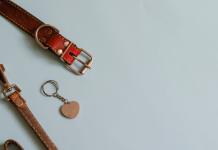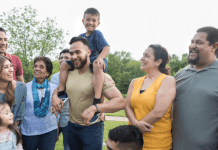Children are curious by nature. It’s our job to answer their tough questions in the best way possible that they can understand. I feel it’s important to do this because, ultimately, I want my kids to always think critically!
Even when my kids ask me the ULTIMATE tough question (“Is Santa real?”), I always answer with, “I don’t know, what do you think?” That way I didn’t TECHNICALLY lie to them!
I’ve been told fairly often that my kids have a lot of questions and are very intuitive. Our kids have been conditioned to try to understand all things and ask tough questions because they deserve answers! I absolutely love that!
The tough questions started for us when our kids were toddlers. We would always try to answer them in the most honest way possible and in a way they could understand. We never wanted to say, “We’ll explain when you’re older.” I’m proud to say we have been able to tackle pretty tough questions in very simple terms. Kids shouldn’t be underestimated. They can handle adult topics and may even find ways to help!
 Shootings
Shootings
On the day of the shootings here in El Paso, the day that changed our community forever, I couldn’t really function. We were supposed to go out for lunch right in front of the mall and instead we locked ourselves inside and glued ourselves to the television. The tough questions on that day were some of the toughest questions we’ve ever had to answer.
At first, I got upset with our children because they were frustrated about not being able to eat out. Then I realized that was the wrong reaction to have. They had no idea what was going on and it was up to us to explain it to them in a way they could understand.
We sat the kids down and tried to explain to them what happened while still trying to cope with it ourselves.
We told them that someone had a lot of hatred and held on to that hatred to do something bad. Then we told them how several innocent lives were lost because of that hatred. We explained to them why things like this sometimes happen. We explained to our kids that hate is something that is taught. And we told them that sometimes people act on emotion instead of talking about their emotions.
I wanted so badly for them to understand. I wanted them to soak in what we were telling them. But I knew it was difficult for them to grasp. How can you grasp a situation like this when the situation is so unfathomable? Even though they didn’t quite understand everything we were saying, I’m glad we sat down to talk about it. I felt it was important to at least attempt to explain. I want them to be able to look back when they’re older, articulate how they felt, and ask those tough questions.
It was important to highlight how the community came together that day. I took words from Mr. Rogers when he was asked to address the nation after 9/11. I told our children how tragedies like this always bring out the helpers. How good people always drown out the bad in situations like these.
Protests
2020 was a tough year for all of us, especially those of us who had young kids. When our kids started asking those tough questions about the protests against police brutality, we answered honestly.
We told them in very simple terms what was happening and why. We ended by asking them what they thought and if they thought the color of one’s skin should determine how someone is treated. Then we asked them what they thought they could do to help create change. They were all shocked that things were different for people based on the color of their skin. We talked about our culture and the color of our skin. At the end of the conversation, they told me they would never treat anyone differently based on the color of their skin.
Respecting Boundaries
We’ve also taught our kids, at very young ages, to respect their bodies and respect boundaries. There were no tough questions that were asked regarding this subject. But it’s a difficult one to approach because our kids are so innocent. I do feel it is very important to have the conversation with your kids as young as possible.
I appreciate that our pediatrician makes it a point to explain it to them at every check-up as well. Our therapist has taught us the importance of using anatomically correct names for body parts as opposed to playful names we are used to using. In doing so, our children understand the importance of those body parts and normalize talking about them.
We’ve taught our kids that NO ONE is allowed to touch them in their private parts (we use the real words though). We also tell them that there are no secrets that should be kept from mom and dad. We’ve also ingrained in them that no adult should tell you to keep a secret from mom and dad.
Environmental Issues
A lot of the tough questions we tackle deal with animal and environmental rights. At ages 9 and under, my kids know a lot about the palm oil industry, deforestation, factory farms, and global warming.
We stay away from palm oil and that means reading every single ingredient on the back of packaged food. One time we were looking for chocolate chips. I remember my son got so frustrated and blurted out, “Let’s just eat palm oil! Who cares!” (He was probably seven years old at the time). This wasn’t a tough question as it was more of a statement. Nevertheless, I felt the need to answer.
I can’t help but laugh as I write this. So there we were in the grocery store when I went on this philosophical rant about the importance of having strong convictions. After a couple more minutes of intently reading ingredient labels, we were able to find palm oil-free chocolate chips!
Strong Convictions
I’m strong in my convictions, also known as stubborn, and because of this, I feel like my kids will have A LOT of stories to tell when they are older. In some of those stories, I COULD be portrayed as a crazy person. BUT, I hope they learn that it’s not impossible to follow through with your convictions. It just takes a little more time!
Building Trust
We want our children to feel like their tough questions will always be acknowledged. We will always try our best to explain in the best way possible. If we don’t know the answer, we can always research it together.
Our goal is to make our children feel comfortable enough to ask anything. Nothing is off-limits. We love that we have an open dialogue with our children. No question is ever dismissed. I know the questions will be tougher when they get older, but my hope is we will always be the first ones they turn to for answers.
Originally published January 2022.
The opinions expressed in this post are those of the author. They do not necessarily reflect the official policy or position of El Paso Mom, its executive team, other contributors to the site, its sponsors or partners, or any organizations the aforementioned might be affiliated with.









